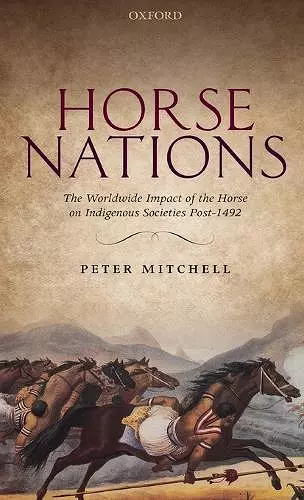Horse Nations
The Worldwide Impact of the Horse on Indigenous Societies Post-1492
Format:Hardback
Publisher:Oxford University Press
Published:26th Mar '15
Currently unavailable, and unfortunately no date known when it will be back

The Native American on a horse is an archetypal Hollywood image, but though such equestrian-focused societies were a relatively short-lived consequence of European expansion overseas, they were not restricted to North America's Plains. Horse Nations provides the first wide-ranging and up-to-date synthesis of the impact of the horse on the Indigenous societies of North and South America, southern Africa, and Australasia following its introduction as a result of European contact post-1492. Drawing on sources in a variety of languages and on the evidence of archaeology, anthropology, and history, the volume outlines the transformations that the acquisition of the horse wrought on a diverse range of groups within these four continents. It explores key topics such as changes in subsistence, technology, and belief systems, the horse's role in facilitating the emergence of more hierarchical social formations, and the interplay between ecology, climate, and human action in adopting the horse, as well as considering how far equestrian lifestyles were ultimately unsustainable.
As well as offering a template for the melding of historical, anthropological and archaeological data, methods and perspectives, Horse Nations is a substantial contribution to the study of borderland environments, middle grounds and hybrid societies. It is also a major addition to the field of horse history * Times Literary Supplement, Peter Coates *
Horse Nations enriches the potential engagement between archaeology, history and anthropology on the topic of the horse, and in human-animal studies more generally ... Horse Nations points the way to more work to come. * Kathryn Renton, Cambridge Archaeological Journal *
essential reading for all those interested in the study of human-animal relations, offering valuable access to documentary, iconographic, and bibliographic sources taken from colonial and contemporary history, archaeology, and anthropology. * Messias Basques, Current Anthropology *
a long awaited work that fills a significant lacuna in equine literature. The book adeptly mines an abundance of relevant, but often previously unrecognized, geographic, archaeological, ethnographic and historical references to reconstruct the complex conditions that grew out of the appearance of the horse in North and South America, South Africa and Australasia from the late 15th century on. Eloquently woven, the story unfolds in a captivating manner that expertly leads the reader through the tangled web of history like a native guide through a rainforest ... this volume certainly will not disappoint. It has the ingredients to become an oft-referenced guide for historic periods in which the horse burst out of Eurasia and surprised countless indigenous peoples with its peculiar looks and amazing swiftness. It shall, no doubt, earn a favorite spot in the libraries of equine experts and enthusiasts internationally. * Sandra L. Olsen, Journal of African Archaeology *
Horse Nations provides the first in-depth synthesis of the impact that horses had on indigenous groups located on the periphery of European colonialismin the post-1442 period ... presents interesting comparative fodder for researchers studying the adoption of new commodities or domesticates from any time period and also to those interested in exploring the diverse ways indigenous societies interacted with colonial processes. * Sarah Newstead, Medieval Archaeology *
Mining an impressive collection of ... sources in multiple languages, Mitchell has produced an interpretative compilation full of information and insight that should be an important reference for researchers who are continuing to blaze new trails in our knowledge and understanding of indigenous peoples' reception and integration of the horse. ... Mitchell's work should spark and stoke even more scholarship that situates this region's rich history in its global context. * John P. Husmann, Great Plains Quarterly *
highly interesting for historians or others interested in understanding continuity and change and not the least researchers interested in colonial impact and interaction between Europeans and indigenous people. * Susanna Hedenborg, idrottsforum.org (Nordic Sports Science web journal) *
ISBN: 9780198703839
Dimensions: 222mm x 148mm x 29mm
Weight: 792g
464 pages